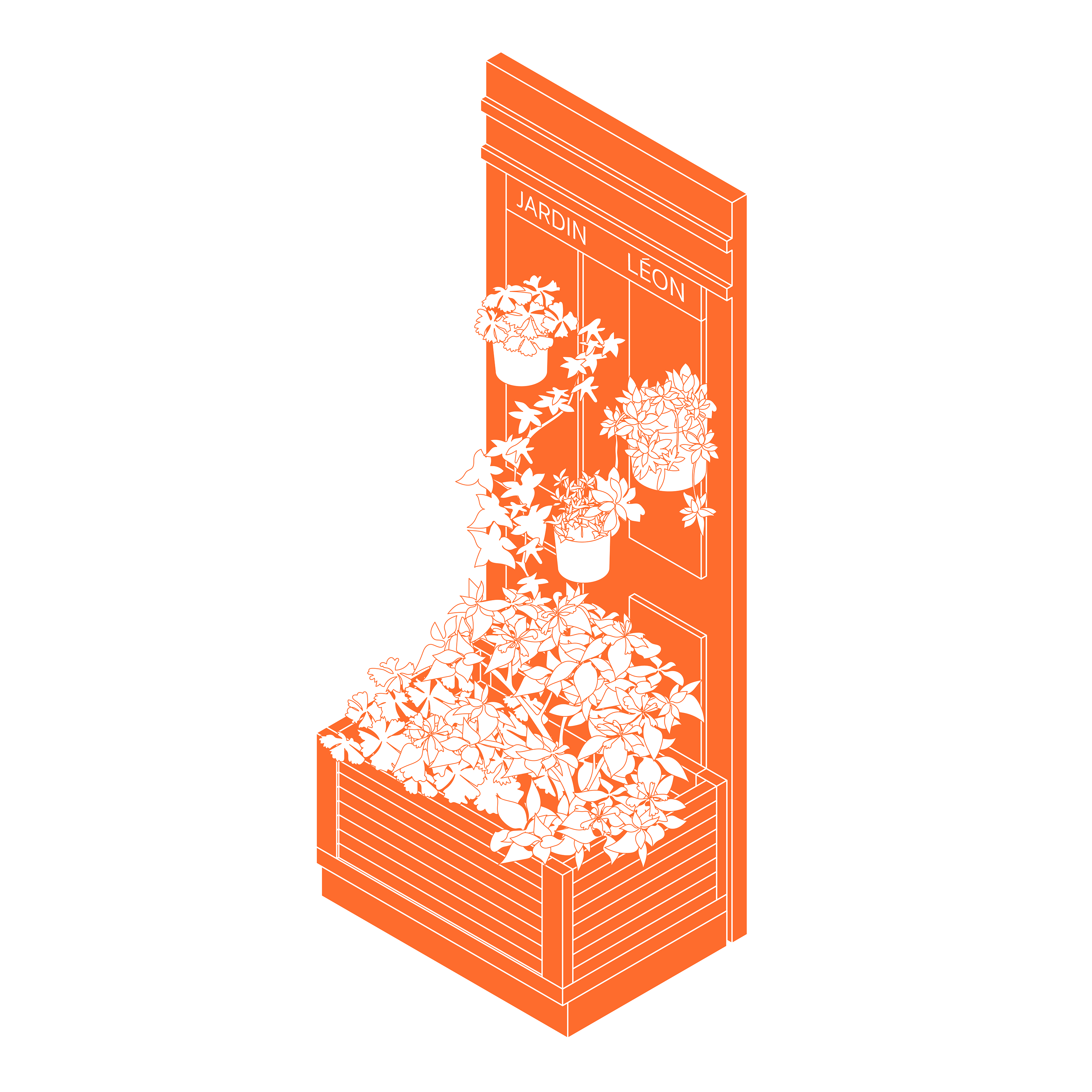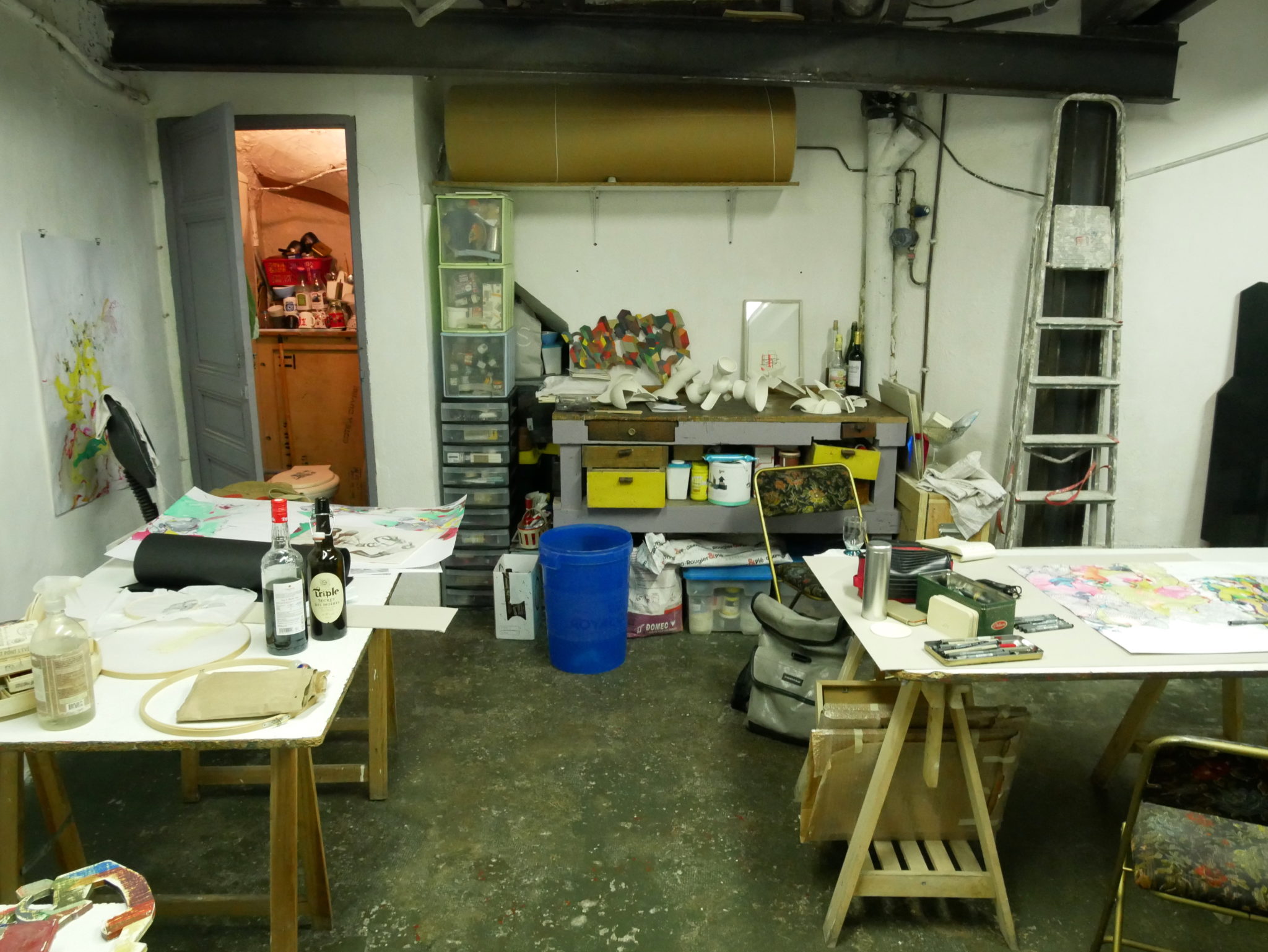Mixed Media Artist

“I’ve been living [on top of my studio] for 25 years. And I’ve had this studio for 17 years. And my neighbours moved here 20 years ago, I think. And they have the same organisation as me: the ground floor and the first floor. We were the first two studio spaces on that chunk of street. […] But already in the 19th century, on Boulevard Longchamp, there were artist studios. […] And this street was [...] not fully urbanised. And what you call “garages”, they were often used for storage. And to house horses. And then in some of these spaces you have a well, and below there’s often access to a source of water. […] So here there were many makers that had their workshops here [in the 20th century]. And then we, artists, we got there. With a few artisans [makers] remaining.”
- Informal network
- Local community
- Urban context
“Today there’s some speculation going on. When the TGV [high-speed train] connection to Paris was opened [in 2001], there was a wave of Parisians who bought flats here. There were like: the family in the south, and then I go up to Paris during the week, it’s three hours in both directions. A bit long, but doable. You go to Paris on Monday morning and back on Friday evening. But I think they got bored in Marseille, because back then, there were not that much activities, so many events. And currently, we have a second wave, because you know rents didn’t really go up that much in Marseille during a certain number of years. And now it’s unbearable, because everybody wants to go get their taste of the Mediterranean Sea. And now it’s impossible to buy anything, when you have a small budget.”
- Other charges
- Rent
- Urban context
“And the space [the flat above and the studio downstairs] is in terrible condition. I mean, terrible… I had to struggle to get [my landlord] to prop up the beams that support the building because otherwise, it was going to collapse before the Rue d’Aubagne.”
- Ecology
- Cleanliness
- Damages
- Adaptation
- Found conditions / Suitability
- Ownership / Management
“I’m a painter originally. But I also do sculpt, drawing, photography, engraving… different type of media. […] In my practice I’m very slow. I need some good space to work. ”
- Product / Work mode
- User experience
“In the summer I work with the door open [on the street]. I love that. I just don’t see people. I put a little something [at the doorstep] otherwise people come in… “Yes, but it was open!” “I know but it’s not the Galerie Lafayette [a famous department store], there’s a gate here.” But people from the area are really nice, they’re really happy to have artists, they also come with questions. […] But we have to endure gentrification, and that’s hell. Because people have no shame, they’re like “Everything belongs to me.” They’re like “Who are you? What do you do?”. They don’t even say “Bonjour”. These ones are really annoying.”
- Local community
- Product / Work mode
- Public relation & communication
- Physical accessibility / Location
- Physical visibility
- Urban context
“Here I have a commercial lease. Even though I wanted an artist studio lease [bail atelier]. And that’s where there’s some misunderstanding. For them, an artist is doing some business. We’re not doing businesses, that would be a gallery. [And that kind of lease] it’s not very protective — you need to take care of the façade, of the door frame. ”
- Contract
- Rent
- Designated regulations
- Planning laws / Policies
- Adaptation
- Ownership / Management
“The issue if I have to leave here will be to find a studio space. Because you do have municipal artist studios, they’re live-work spaces, in the Panier. […] I’ve got lots of friends who live there. So it’s a small flat with a big artist studio that’s part of it. […] It’s something that’s quite rare, that doesn’t exist elsewhere [in Marseille]. And it’s a shame […] because it’s amazing to have both. What I’m really looking for is to have some space, that I’d need to redo if needed because then it’s cheaper, and to have 30% housing and 70% workspace. ”
- Contract
- Cost
- Rent
- Local community
- Professional network
- Urban context
“I work at my day jobs [in a museum] between 9am and 5pm or 6pm. And then here when I’ve got the energy. But I’m mostly at work during weekends, when I’ve got holidays… But actually, it depends. It’s like for any artist, it’s the urge, the deadlines. If I have an upcoming exhibition, I can be super efficient. But otherwise I’m really really slow, over two or three years. ”
- Product / Work mode
- Time
- Period
- Working hours
“A studio is a bit like a mental space. It’s like a box and if you come here… For me a workspace is so important. […] That’s why having two doors is really different. When I rented my flat [on the first floor] it was for the light. There’s a beautiful light, it’s north-east. The light of the painters. [...] The issue is that I took [the flat] for the light but back then I was working on paintings that were 2.20 meters by 1.70 meters. And the chassis didn’t fit in. So since there was a storage space downstairs, I put them there while I waited for an artist studio. I painted in my living room, but with oil paintings it was hell. I damaged my liver a bit, let’s say. And then I found a studio in a flat in Belsunce, it was a flat [200 square meters] we’d share amongst different artists. [...] And I had really big space. We all had different practices, we got along really well. It was really enriching. So that’s why the space of the studio is so important. Nobody to bother you. If you don’t want to open the door, you don’t. If you want to host, you host. You organise parties, all right. But it’s like it was your head, but bigger. You’ve got your thoughts here. It’s really that, it’s an extension of your head.”
- Ecology
- Light
- Informal network
- Local community
- Product / Work mode
- Professional network
- Adaptation
- Found conditions / Suitability
- Urban context
“But we left that flat [in Belsunce] because the city evicted us. Back then… it was Rue Longue-des-Capucins, and then the TGV arrived, it was maybe right after that. They started to cleanse the Arab neighbourhood [Belsunce], and the excuse was to redo the flats so that they could resell to people… that’s where gentrification really started. They wanted to cleanse the city centre, but it didn’t work out…”
- Planning laws / Policies
- Urban context
“[The neighbourhood] is changing. It’s becoming noisier. There’s been a few incidents. Like, just three weeks ago at midnight I had to call the fire brigade because the wheelie bin [in the street] was on fire, I mean, someone had lit the bin up. Last summer, down the street, the wheelie bin was put on fire, and it destroyed the car next to it with a number plate 75 [the area code for Paris] and it damaged a building. And last summer again, in the street just behind, two cars, one wheelie bin, one motorbike caught fire. There are small groups of drug dealers, and it feels they're coming closer. You can feel the tension.”
- Local community
- Urban context
